For those with naturally kinky or tightly coiled hair, relaxers can help achieve a straighter, smoother hair texture. However, the chemical process of relaxing hair can often leave strands feeling dry, brittle, and damaged over time. Many people experience breakage or slower hair growth after relaxing hair.
Relaxed hair is not easier or harder to take care of than natural hair. You can learn how to take care of relaxed hair and make it grow longer and healthier. We researched, listened to a few relaxed hair care experts to help you take care of your relaxed hair.
What Causes Relaxed Hair Breakage?
Different factors could lead to relaxed hair breakage. But first, you need to understand the scientific composition of your hair. Your hair consists of a variety of protein cells.
Three different bonds bind these cells together to give rise to what you see as your hair. The glue-like effect of these bonds and their shape determine if your hair becomes curly, coiled, or straight.
The process of relaxing your hair has a permanent effect on these bonds. This is because chemical relaxation weakens the glue-like effect of the bonds.
It also changes the shape of the bonds in a bid to make your hair straight. Weakening and re-arranging these bonds increases the susceptibility of your hair to breakage.
Here are the factors that are notorious for damaging your relaxed hair.
1. Dehydration
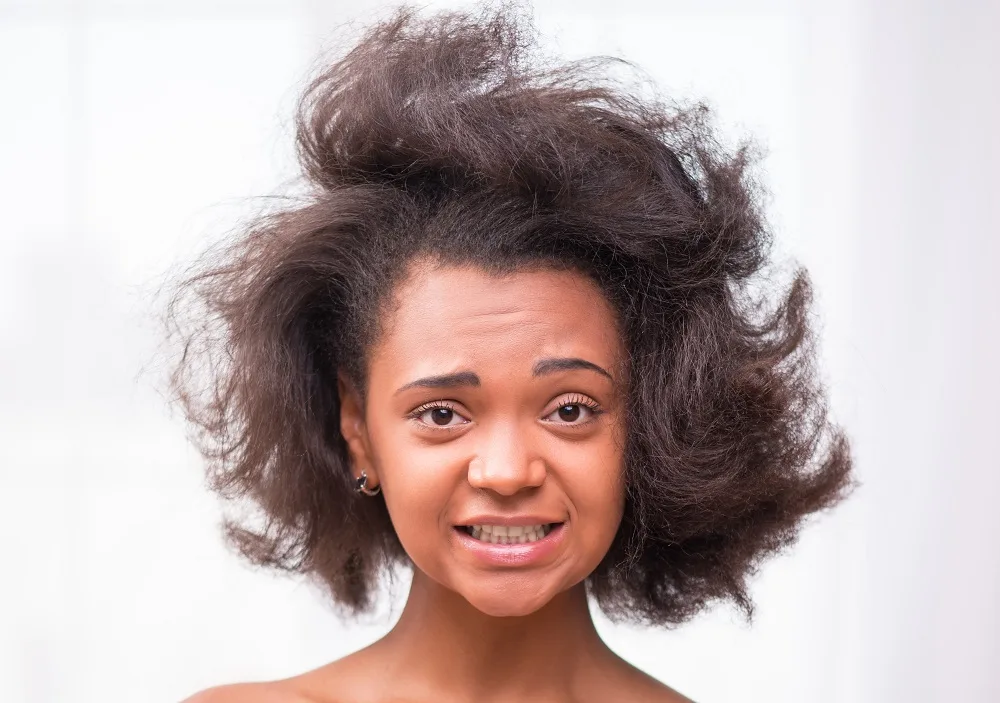
Whoever said water is life must have had relaxed hair in mind. Drinking enough water throughout the day replenishes your hair’s moisture. This goes a long way in keeping it healthy and resistant to damage.
Dehydration starves your hair of its natural moisture leading to weakening the bonds responsible for averting breakage.
2. Heat
Heat-styling your relaxed hair once in a while is good for maintaining aesthetics. It would be best if you tried to restrict heat-styling to once a week.
Anything beyond that will sap moisture away from your hair. Relaxed hair that lacks moisture tends to be brittle over time. It will then start to break excessively.
3. Ignoring Protective Styling
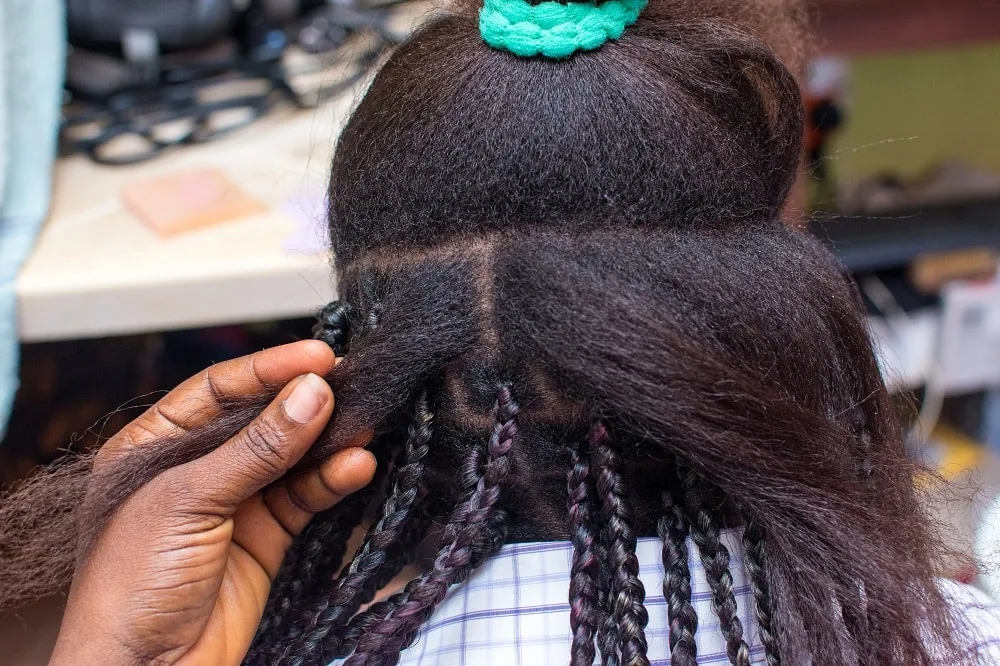
The ends of your hair are fragile and old. Whatever you do with your hair affects this part by weakening it. It is advisable to opt for protective hairstyles when you relax your hair. In protective hairstyles, your stylist tucks in the ends of your hair.
This prevents your hair from drying out. It also prevents the hair from brushing against your clothes and other elements. Protective hairstyles promote consistent hair growth.
4. Constant Touch-Ups
You should go for a touch-up when you notice new growth after relaxing your hair. Frequent touch-ups encourage overlapping on your hair. This means relaxing hair that you have already relaxed.
Bear in mind that relaxing your hair changes its structures permanently. So, going for frequent touch-ups hastens the damage process, which is a by-product of relaxing.
5. Using Many Hair Treatments at the Same Time
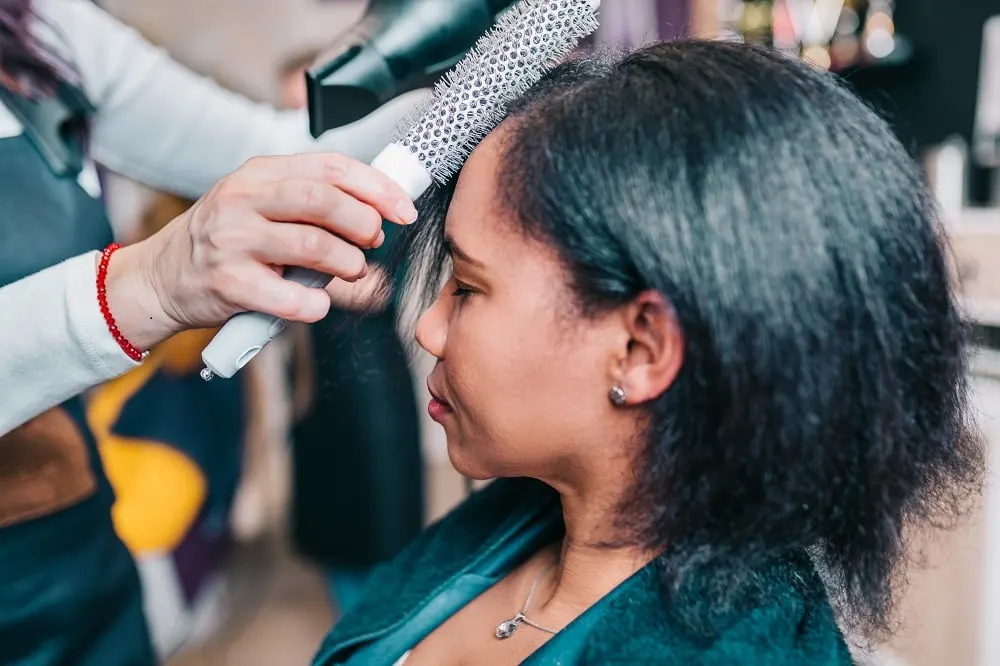
The relaxing process is very tough on your hair. But, for most people, the hair is strong and can withstand it as long as you do the process well.
Combining or trying out a variety of hair treatment procedures at the same time kills the resilience of even the strongest of hairs. Take the case of applying permanent dye to your relaxed hair.
The dye will cause further destruction to your hair that’s already grappling with the weakening effects of the relaxing process. Your hair wouldn’t stand this type of pressure for long. You’ll notice it breaks faster than usual.
6. Inappropriate Use of Protein Treatments
It makes perfect sense to think that applying protein treatment to your hair does it justice. After all, you’re just augmenting the composition of your hair. The trick lies in your frequency of using protein treatments.
Right now, a majority of hair products include protein as one of their ingredients. Failing to read the ingredients list might put you in a tough position.
You’ll inadvertently overload your hair with protein treatments. The result will be dry and brittle hair that breaks often.
How to Avoid Breakage in Relaxed Hair
The good news is it’s possible to prevent or limit relaxed hair breakage. All you need is to follow these tips to the letter.
Control the Heat
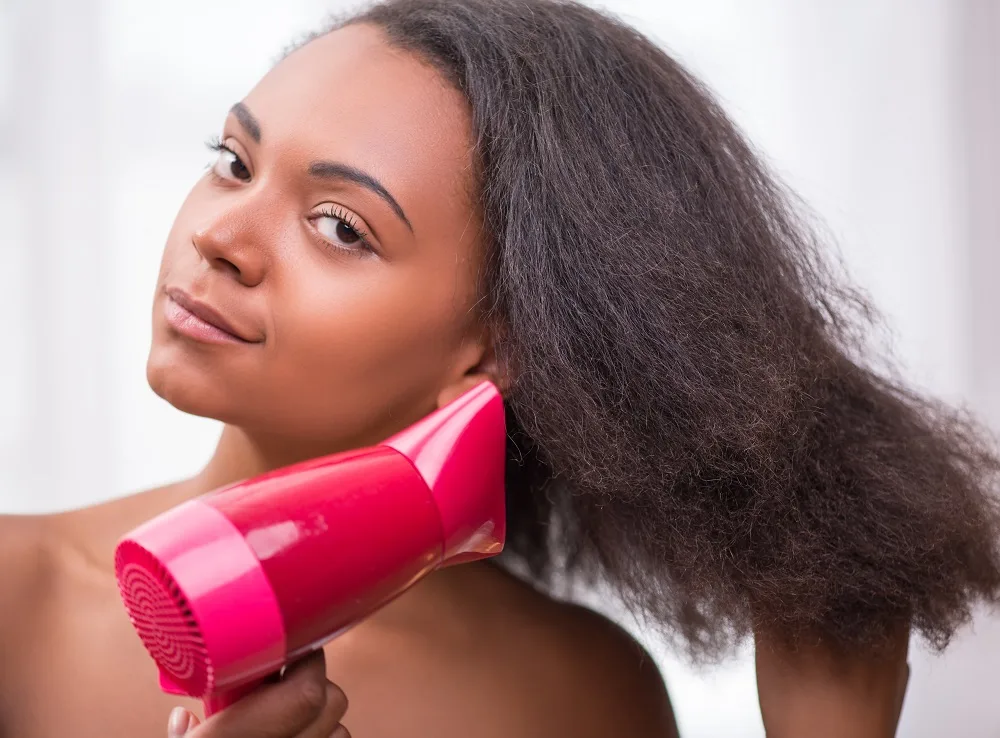
Natural hair is excellent at withstanding too much heat. You shouldn’t expect the same from relaxed hair because it’s weaker, and relaxing deprives your hair of some moisture.
Restrict the settings of your blow-dryer to “cool” whenever you need to use it. Or, stick to air drying whenever you are in a position to.
Before using heat styling tools, apply a heat protectant to your hair first. And even then, use the styling tool at low temperatures only.
Do Not Over-Process
Avoid using relaxers on hair that’s breaking. Also, you should minimize the frequency of using any chemicals on your hair. Space touch-ups to at least eight weeks apart.
This enables you to apply relaxers on new hair growth instead of overlapping. Protect the ends of your hair by applying heavy conditioners or oil before relaxing it.
Be Gentle When Styling
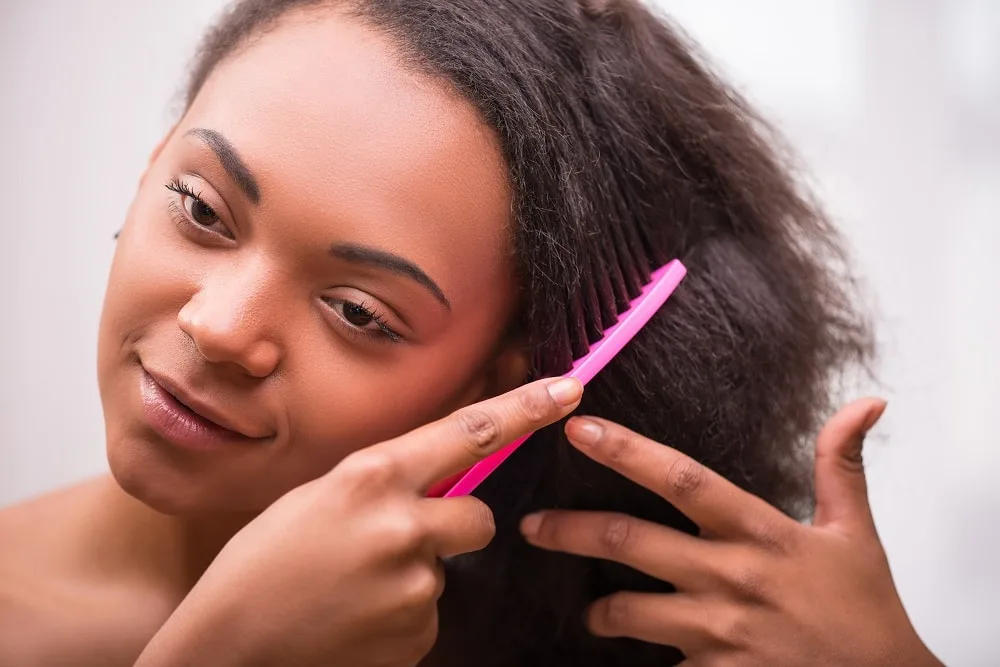
Relaxed hair breakage is rampant during the styling process. This is because most people don’t handle their hair with care during styling. And they try to do lots of stuff with their hair at this point.
As a rule of thumb, detangle your hair with a wide tooth comb. Only detangle your hair when it’s dry. Relaxed hair breakage increases when you wet your hair before detangling it.
Hydrate
Dry air is a common cause of hair breakage. Hydrating helps hair strands retain or even improve their elasticity. This, in turn, increases their resistance to different types of damage, including breaking.
Aside from water, aloe vera and glycerine products are good at increasing the moisture content of hair strands. Take advantage of them.
Reinforce Your Hair with Protein Treatment
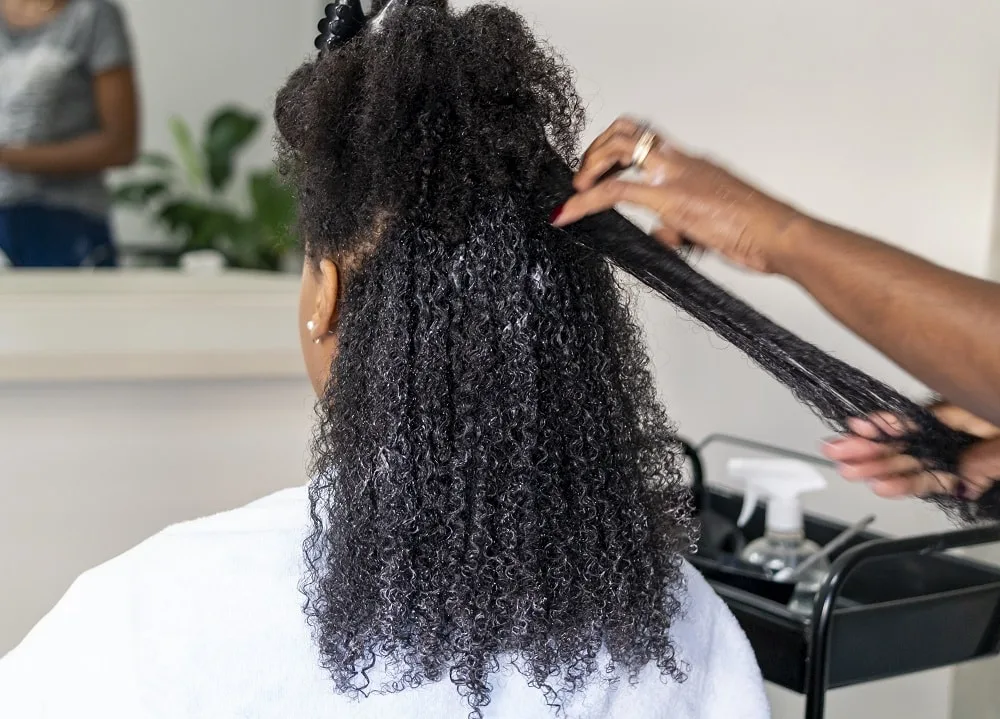
Protein treatments work magic on the hair when you use them properly. Before getting a relaxer, strengthen your hair with the right protein treatment.
Do this for at least a week before getting the relaxer. Use a moisturizer alongside the protein treatment to give your hair a perfect balance between moisture and keratin.
How to Repair Relaxed Hair Breakage
Stay calm if you notice that your hair is breaking. Then start by figuring out what’s causing your hair to break. Is it that you are too aggressive when brushing it, or are you using too much heat/chemicals on your hair?
Once you have an answer to this question, then there’s your solution. If it’s too much heat, moderate the temperature to healthy levels. If it’s over-processing, cut back on it. Moisturize your hair and get safer protective hairstyles. Also, trim the damaged portion. If the problem persists, seek professional help.
To avoid relaxed hair breakage, first, ensure you understand the common causes of relaxed hair breakage, such as excessive treatments, too much heat, failing to hydrate, and overprocessing, among other causes.
Then start implementing good practices that prevent hair breakage. Some include gentle styling, moisturizing, proper spacing between touch-ups, and protective styling.
Does Relaxed Hair Grow Out?
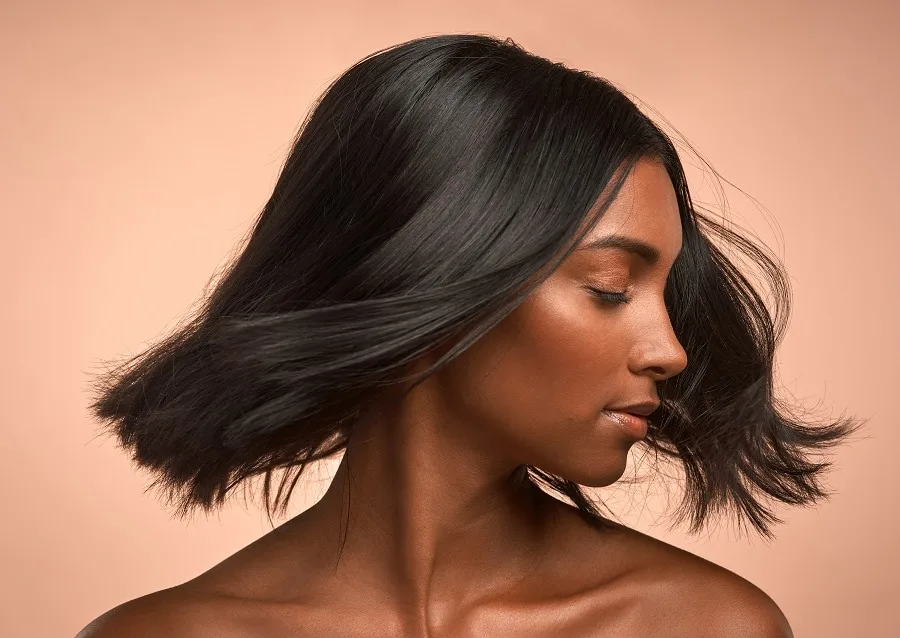
Relaxed hair grows out unless someone has an underlying health issue or condition preventing hair growth, like alopecia or mineral deficiencies. Hair grows out of the scalp, whether it be natural, dyed, relaxed, or has undergone any other chemical and natural treatment.
As long as there are no internal problems in the body or scalp issues, your hair will grow regardless of what processes you used on the strands.
Why Is My Relaxed Hair Not Growing?
Here are reasons why your relaxed hair isn’t growing:
- You don’t deep condition or treat your hair, denying it nutrients and moisture for length retention
- You overmanipulate your hair by heat styling, too much styling, or using high-tension hairstyles
- You are relaxing too soon without enough new growth and thus overprocessing your hair
- You stretch your relaxer too far and thus experience more breakage due to too many hair textures on your head
- Your scalp is dirty or inflamed, causing clogged pores
- You are suffering from hormonal imbalances or alopecia, which causes hair loss and lack of hair growth
- You are doing too many chemical processes on your hair, like dyeing or bleaching.
How To Take Care of Your Relaxed Hair
Maintaining your relaxed hair is important. Here are our best nine best tips to take care of relaxed hair:
#1. Keep Your Scalp and Hair Clean
Hair care always starts with scalp care. It is crucial to keep your scalp clean to provide the right environment for hair growth. If your pores get blocked with grease and dirt, you will experience less hair growth and hair fall. A dirty scalp also invites dandruff, itching, and inflammation.
Don’t wash your hair too much as it will lead to a dry and inflamed scalp and dry hair. For most, washing your scalp weekly with a hydrating shampoo and once a month with a clarifying shampoo works.
This schedule can change depending on how much you work out, the climate where you live, and the seasons. You can also try a midweek co-wash.
#2. Keep Your Hair and Scalp Moisturized
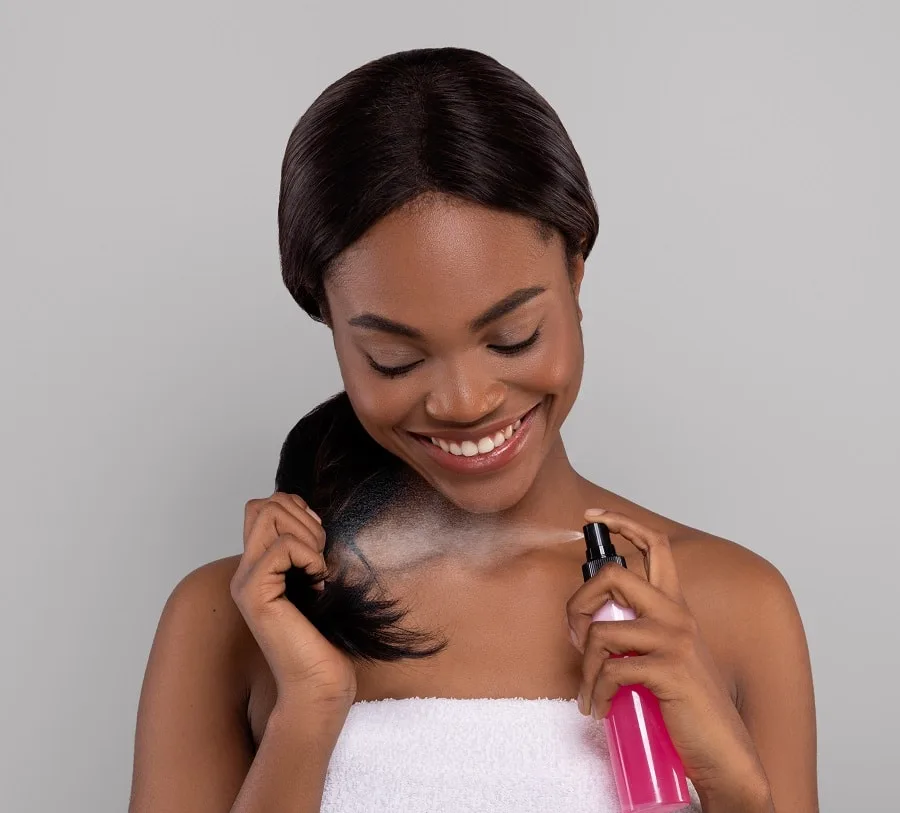
Keeping your hair moisturized can help stop breakage, leading to better length retention. A moisturized scalp is less likely to become inflamed, oily, or dry.
Some people do a moisturize-and-seal routine every other day. Others do it only on wash day or twice a week. Try different methods and find which works for your hair. Do not saturate your hair with the product when moisturizing.
You can’t moisturize with oils and butter. Use hydrators like mists, serums, and water-based leave-ins. Ensure the first ingredient is water and that most components are humectants like aloe, honey, butylene glycol, and glycerin. Seal with a light oil like grapeseed or sesame oil to avoid weighing your hair down and causing breakage.
#3. Eat Well and Stay Hydrated
It is crucial to nourish and hydrate our bodies for hair health. Incorporate more fruits and vegetables into your diet to get micronutrients and vitamins. Drink at least two liters of water daily, adjusting for seasons and movement.
Ensure you eat loads of protein to help grow your hair and keep it strong. Most protein sources are also rich in vitamin B, calcium, and iron, which are needed to grow hair. Get outside and get some vitamin D as often as you can.
Consult a doctor to know if you are deficient in minerals like iron and omega 3s and vitamins such as B, D, C, K, and A. Supplement what you are lacking.
#4. Have a Consistent Relaxing Schedule but Avoid Overprocessing
You must stick to a regular relaxing schedule. Many people experience breakage because they don’t relax their hair on a consistent schedule. Unless you are transitioning to natural, find a timeline that works for you and stick to it.
You can stretch your relaxer for as long as you want. However, the more natural hair you have, the higher chance of breakage due to the difference in texture.
When stretching your relaxer, be extra careful and tender. If you cannot stretch your relaxer without causing damage to your hair, relax your hair after eight weeks to ensure length retention.
#5. Deep Condition and Use Protein Treatments
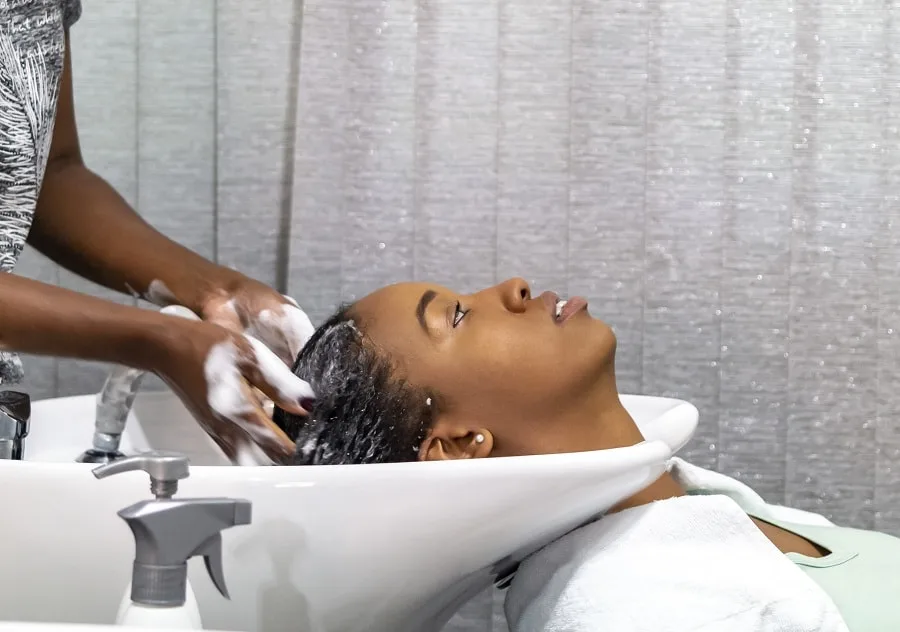
Deep conditioning is a great way to provide relaxed hair with the nutrients and moisture it needs to retain length. Look for deep conditioners filled with humectants.
You can add light oils to help nourish the hair if the deep conditioner does not already have them. Most people use deep conditioners once a week, so try this schedule and adjust as your hair needs.
You can use protein treatments biweekly, monthly, every six weeks or every two months. Your schedule will depend on hair porosity and how your hair responds to protein. You can also choose to use a protein-moisture balanced treatment instead of a pure protein treatment.
#6. Be Smart with Color
If you want to color your relaxed hair, be very careful. Get a professional to examine your hair and determine its health and state.
Avoid bleaching or coloring your hair for at least two weeks before and after getting a fresh relaxer. This ensures you do not overprocess your hair and cause breakage. Use only professional color and don’t overdo it.
For those trying to dye their hair darker, ensure that you get professional color and have a certified hair stylist do it. It is also advisable to wait two weeks after a relaxer to dye it darker. You’ll retain more hair length by avoiding back-to-back processing.
#7. Avoid Direct Heat and Overmanipulating Your Hair
Relaxed hair is more prone to breakage than natural hair. Your hair has already undergone an intense chemical process to restructure the bonds. Limit your use of direct heat like a flat or curling iron.
Avoid daily styling, rough combing, and high-tension hairstyles. When using protective hairstyles, stick to low manipulation and low tension styles.
#8. Trim Dead Ends
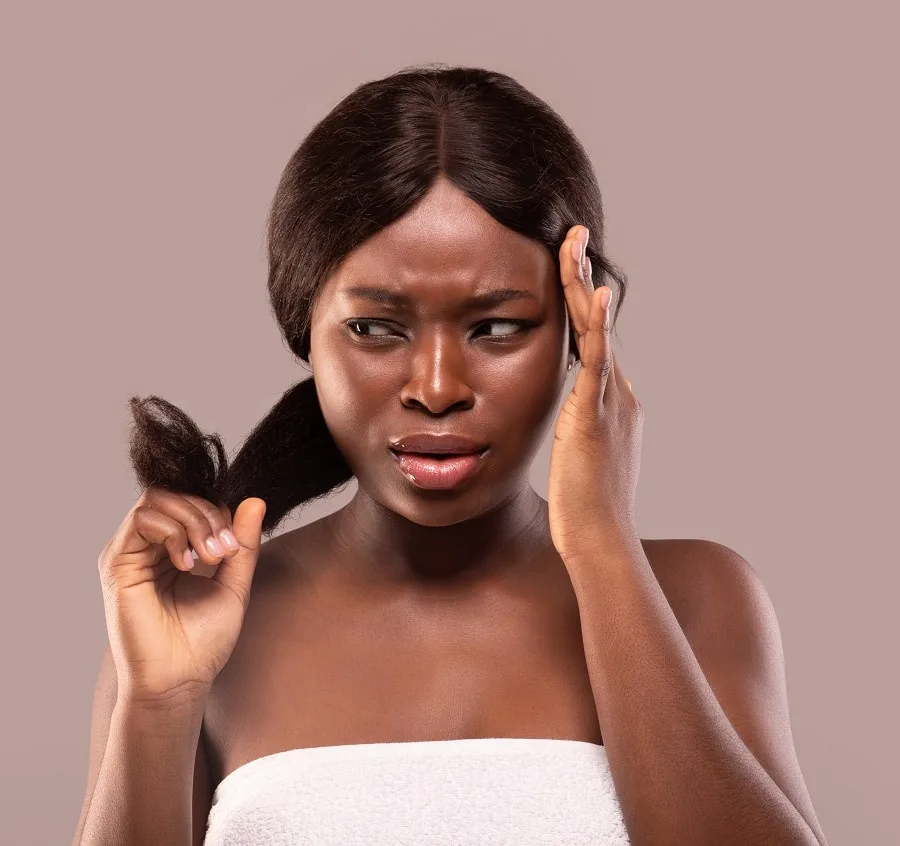
Holding on to dead and split ends only causes more damage. To avoid having long but damaged hair, get your hair trimmed. Have a professional you trust check for split or dead ends and trim them.
To avoid stunted growth, keep hair shears at home. Check for split ends yourself and immediately trim. Split ends travel up the hair strand, causing even more breakage. With time, you will find that you hold on to more hair length as your hair does not break as often.
#9. Protect Your Hair When You Sleep
When you go to sleep, keep your hair protected using a stocking, bonnet, cap, scarf, or socks. Ideally, use items made of silk or satin as these materials keep your hair from getting frizzy and reduce friction.
Protecting your hair at night will ensure no tension or friction on the strands while you sleep. For long, relaxed hair, braid it in sections before wearing your bonnet or scarf.
Products and Treatments for Maintaining Healthy Relaxed Hair
Here are Below you’ll find a list of products and treatments for maintaining relaxed hair health.
Protein Treatment for Hair Strength
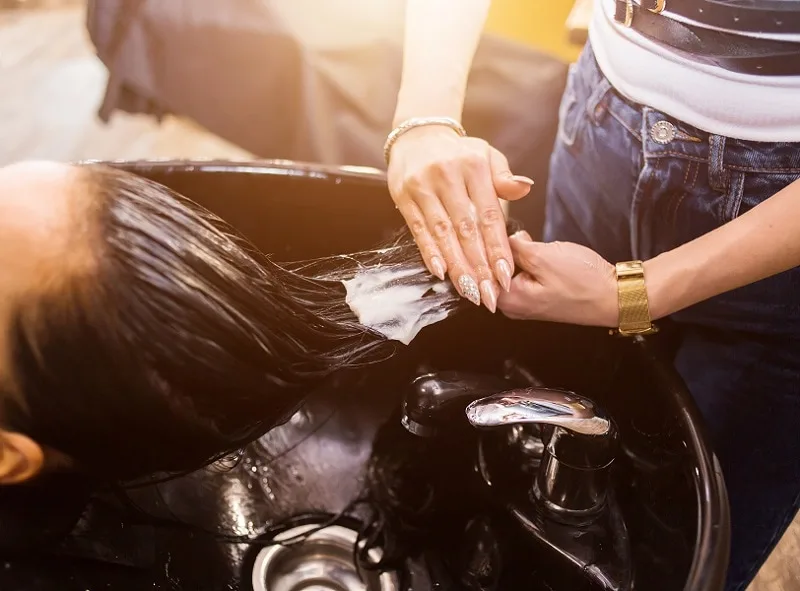
The process of hair relaxation destroys most of the healthy proteins in your hair. That’s why you should treat your hair with additional proteins to maintain its strength.
Be careful. Too much protein can also lead to damage. Try to keep protein treatments to once per month or as specified on the product’s packaging.
Conditioning
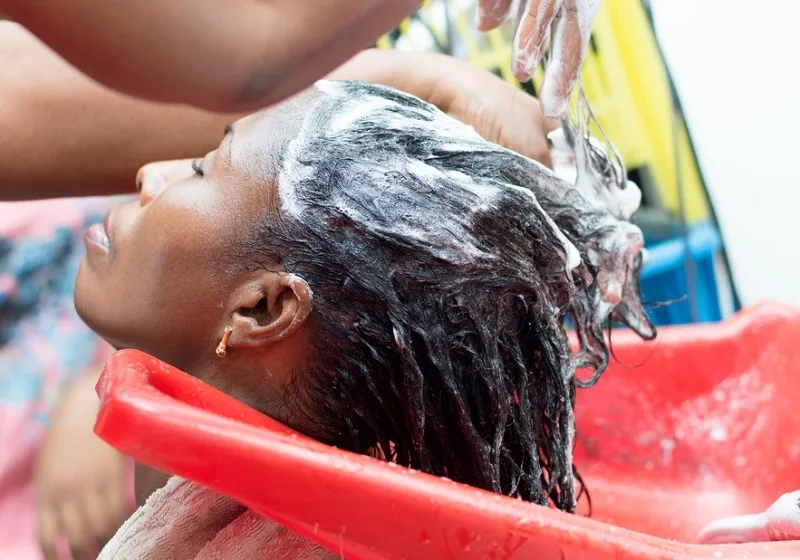
Paying extra tension to the conditioning process is also essential. Conditioning your hair in the shower is one option, but buying a deep conditioner that you leave in for a few hours will have the best results.
You can coordinate the deep conditioning with your sessions at the salon. If you want to put in more effort, then try adding heat while deep conditioning.
Dry Shampoo
Dry shampoo is a product that every relaxed hair person needs to carry with them. It’s just like shampoo, but you can apply it without a shower to maintain moisture in between washing.
It will also help remove the oils from your hair’s roots. Be sure to practice your usual nightly routine even after applying dry shampoo.
Swim Caps
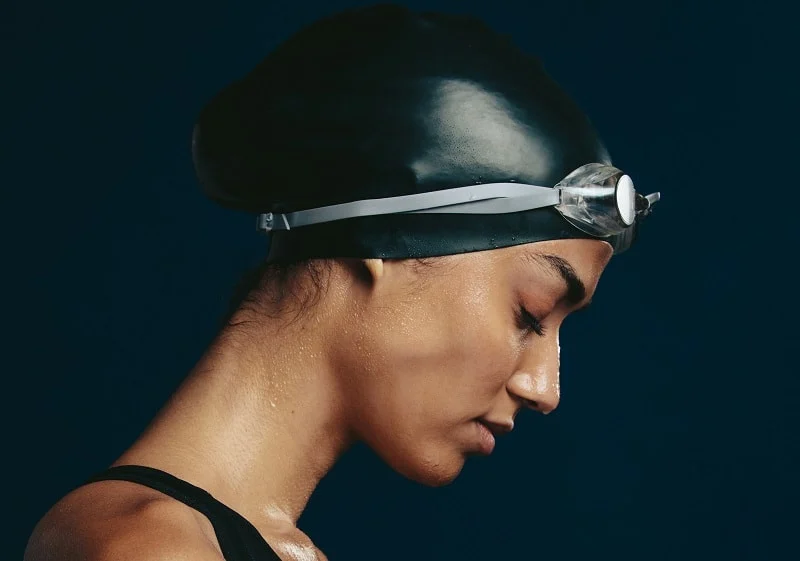
Swim caps are every person with relaxed hair’s best friend. They allow you to get wet whenever you want without damaging your treatment.
Chlorine is hazardous for relaxed hair, so be sure to wear your swim cap whenever you enter a swimming pool.
Humidity Resistant Spray
Too much moisture in the air will always lead to frizz. If you want your relaxed hair to last long, then try incorporating a humidity resistor into your care routine. They are easy to apply and will eliminate frizz immediately.
So, leaving the salon and going back to your typical hair routine is not an option after getting relaxed hair.
Instead, develop your hair care routine based on valuable advice from your salon technician and the tips we mentioned above.
Be careful with your routines and purchase the recommended products for the best results. Keeping your relaxed hair healthy is easy.
How Long Should I Wait to Reapply Relaxer When Growing Out Hair?
You should wait at least eight weeks before you relax your hair again. You need enough new growth to relax to avoid overprocessing already relaxed hair. On average, hair grows half an inch every four weeks. For those whose hair grows fast, you may have up to 4 inches of growth in eight weeks.
You can choose to wait the eight weeks only or stretch your relaxer. Some people stretch their relaxers for up to six months. However, your hair is more likely to break and look dull when you wait too long between relaxers. Find what timeline works best for your hair to ensure you retain length and avoid overprocessing or breakage.
So, How To Grow Long and Healthy Relaxed Hair?
The key to growing long healthy relaxed hair is maintaining good overall health, scalp care, and preventing breakage. You want to focus on:
- Eating nutrient and protein-rich food to nourish your hair from the inside out
- Protecting your hair and avoiding too much manipulation
- Deep conditioning your hair often
- Maintaining a protein-moisture balance to avoid breakage
- Keeping your scalp clean and hydrated
- Avoiding relaxer overlap by waiting for enough growth before retouching and protecting the previously relaxed hair with conditioner, grease, or a balm.
If you consistently follow these steps, you will notice a lot less breakage in your hair. You can supplement these with hair supplements, scalp massages, and rosemary oil if you need help regrowing hair that got lost. Trial and error will help you find what balance of the steps above works best for your hair.
FAQs
If you’re looking to grow your relaxed hair, it’s crucial to know what works and what does not.
Rice water cannot help hair grow but can help relaxed hair retain length. It needs to be well prepared and you need to monitor how your hair reacts to it closely.
Some people’s hair does not like rice water for various reasons, including too much protein. As with all other hair treatments, if your hair is fine, don’t try it.
Yes, a lot of oils have been proven to help grow hair. You can use oils like rosemary, pumpkin seed oil, and peppermint oil diluted in a carrier oil like jojoba or grapeseed to help your hair grow.
These oils can lower a hormone known as DHT, which causes hair loss. They also stimulate hair growth by elongating the telogen phase.
Look at the hair coming off your head and compare it with the length of your hair strands. Seeing hair shorter than your hair strands leaving your head often indicates possible relaxed hair breakage.
Yes, if you don’t relax your new growth, you can transition to natural hair over time. After six months to a year of growing out relaxed hair, you may lose your previously relaxed hair as it breaks off due to the different textures. At this point, you will have transitioned to natural hair.
Related Topics
- Hair Relaxing Vs. Rebonding
- Types of Hair Relaxers
- How to Use Curl Activator on Relaxed Hair
- Hair Relaxer Alternatives
- How to Dye Relaxed Hair Without Damage
- What Happens if You Stop Relaxing Your Hair?
- Benefits of Relaxed Hair
